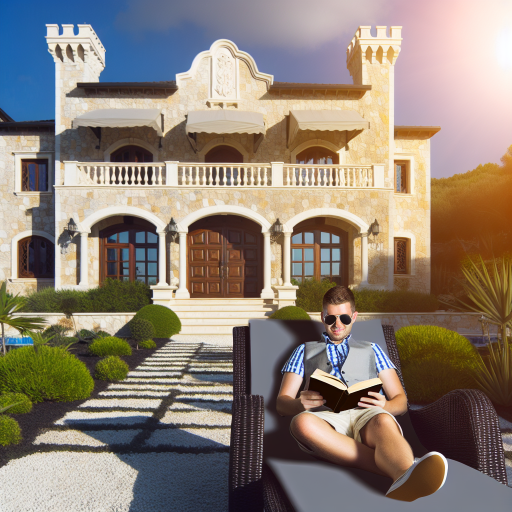Introduction to Luxury Real Estate and Wealth Distribution
Luxury real estate serves as a visible indicator of wealth disparity.
It often reflects broader economic trends and shifts in wealth distribution.
As wealth concentration increases, so does demand for upscale properties.
High-net-worth individuals increasingly seek exclusive homes in prime locations.
This demand drives market prices higher and influences urban development.
Understanding Wealth Concentration
Wealth concentration refers to the accumulation of assets by a small population segment.
Recent studies show that the wealth gap is widening globally.
Consequently, luxury real estate emerges as a key investment vehicle.
Investors view upscale properties as a safer, appreciating asset class.
The Role of Urbanization
Urbanization accelerates the demand for luxury homes.
As cities grow, affluent individuals are drawn to metropolitan areas.
This trend results in increased competition for prime real estate.
Consequently, property values in desirable neighborhoods surge.
Impact of Global Investment Trends
Global capital flows significantly affect luxury real estate markets.
Wealthy international buyers contribute to rising prices.
Transform Your Real Estate Decisions
Unlock personalized real estate insights crafted just for you. Get actionable advice designed to amplify your success.
Get StartedMoreover, they influence market dynamics in local economies.
This scenario often results in gentrification and displacement of lower-income residents.
Luxury Real Estate as Status Symbol
Owning luxury property symbolizes success and wealth.
This status is increasingly crucial for high-net-worth individuals.
Consequently, demand for bespoke properties continues to rise.
Luxury homes often include unique features, enhancing their allure.
Trends and Implications of Luxury Real Estate
Luxury real estate trends indicate larger societal shifts.
They underscore the evolving nature of wealth distribution globally.
Understanding these trends helps predict future market behaviors.
Ultimately, luxury real estate remains a key factor in wealth dynamics.
Historical Perspective on Wealth Distribution and Real Estate Trends
Understanding Wealth Distribution
Wealth distribution has changed significantly over the centuries.
Initially, wealth concentrated among a small elite.
However, industrialization brought forth new opportunities.
This shift allowed larger segments of the population to accumulate wealth.
Showcase Your Real Estate Business
Publish your company profile on our blog for just $200. Gain instant exposure and connect with a dedicated audience of real estate professionals and enthusiasts.
Publish Your ProfileAs a result, the demand for housing increased dramatically.
Real Estate as an Investment
Luxury real estate has often been a reflection of wealth status.
Historically, the wealthy invested in prime locations.
These investments showcased their financial power.
Consequently, real estate became a symbol of prestige.
Many affluent families selected property over other investment avenues.
Impact of Economic Changes
Economic shifts greatly influence real estate trends.
For instance, the 2008 financial crisis altered market dynamics.
During that period, luxury properties faced declining values.
Eventually, recovery led to a new era of high-end developments.
This recovery resulted in luxury real estate experiencing significant appreciation.
Recent Trends in Wealth Distribution
In recent years, wealth inequality has become a pressing concern.
As a result, the luxury real estate market has adapted.
More buyers now seek properties in emerging urban areas.
This trend contrasts with previous preferences for traditional affluent neighborhoods.
Moreover, younger affluent individuals prioritize sustainable luxury.
Globalization and Real Estate
Globalization also affects luxury real estate markets.
Wealth accumulates in emerging economies like China and India.
These markets have seen increased demands for luxury properties.
Additionally, international buyers drive up prices in established markets.
Consequently, cities like London and New York experience fluctuating demands.
Key Factors Driving Shifts in Luxury Real Estate Markets
Economic Trends
Shifts in economic trends consistently impact luxury real estate markets.
The growth of global wealth fuels demand for high-end properties.
Conversely, economic downturns can cool buyer interest.
High-net-worth individuals seek stability in their investments.
Luxury real estate often provides that sense of security.
Changing Demographics
Demographic shifts significantly influence luxury real estate dynamics.
Millennials are increasingly entering the luxury market.
They prioritize urban living with access to amenities.
On the other hand, retirees seek quieter, more spacious environments.
Showcase Your Real Estate Business
Publish your company profile on our blog for just $200. Gain instant exposure and connect with a dedicated audience of real estate professionals and enthusiasts.
Publish Your ProfileThis diversity in buyer preferences shapes market offerings.
Technological Advancements
Technological advancements are reshaping luxury real estate transactions.
Virtual tours allow buyers to explore properties remotely.
As a result, listings can reach a broader audience.
Advanced marketing tools enhance property visibility.
Moreover, blockchain technology offers new investment opportunities.
Globalization of Wealth
Globalization is a key driver of luxury real estate growth.
Wealth increasingly flows across borders.
Foreign investors buy luxury properties in desirable locations.
This trend raises both competition and prices in local markets.
Consequently, cities with global appeal thrive in the luxury sector.
Sustainability Considerations
Sustainability is becoming a critical factor in luxury real estate.
Many buyers prefer eco-friendly and energy-efficient homes.
Developers increasingly integrate sustainable practices into projects.
These features often attract premium prices.
Further, sustainable developments can increase long-term value.
Find Out More: Top Features To Look For In Waterfront Luxury Homes
Impact of Economic Policies on Luxury Property Values
Influence of Interest Rates
Interest rates directly impact the affordability of luxury properties.
When rates rise, borrowing costs increase for high-end buyers.
Consequently, demand for luxury homes may decline.
As a result, property values may stagnate or decrease.
Alternatively, lower interest rates make luxury properties more accessible.
This often leads to increased demand and higher values.
Tax Reform Effects
Tax policies play a significant role in wealth distribution.
For instance, lower capital gains taxes can incentivize investments in luxury real estate.
Individuals may prioritize purchasing luxury homes due to favorable tax conditions.
In contrast, high taxes on property can deter potential buyers.
This creates a slowdown in the luxury market, impacting overall values.
Government Incentives and Subsidies
Government incentives can stimulate luxury real estate investments.
Subsidies for green building practices attract wealthy investors.
Showcase Your Real Estate Business
Publish your company profile on our blog for just $200. Gain instant exposure and connect with a dedicated audience of real estate professionals and enthusiasts.
Publish Your ProfileIncentives often lead to increased property values in luxury markets.
Moreover, development grants can enhance neighborhood amenities.
This improves the desirability of luxury areas, further driving property values up.
Global Economic Trends
Global economic trends impact domestic luxury property markets significantly.
Wealth concentration can shift due to fluctuations in global markets.
This influences where affluent buyers choose to invest.
Conversely, economic downturns may decrease international investment in luxury homes.
Such changes can lead to volatility in property values.
Regulations and Zoning Laws
Zoning laws directly affect the development of luxury properties.
Strict regulations can limit new luxury projects.
This scarcity can elevate existing property values.
On the contrary, relaxed regulations may lead to oversupply.
This could decrease property values as competition increases.
Market Sentiment and Consumer Confidence
Consumer confidence strongly influences luxury real estate values.
Positive economic forecasts boost buyer sentiment.
This encourages more purchases of luxury properties.
However, uncertainty or negative news may have the opposite effect.
In such cases, luxury property values might decline as buyers retreat.
You Might Also Like: A Guide To Customizing Your Country Estate To Fit Your Needs
The Role of Technology and Remote Work in Luxury Real Estate Demand
Technological Advancements Shaping Real Estate
The rise of smart home technology transforms luxury living.
Homebuyers increasingly seek properties with advanced features.
This includes integrated security systems and energy-efficient designs.
Moreover, virtual reality offers immersive property tours.
These technological innovations enhance the buying experience.
Impact of Remote Work on Luxury Living Spaces
The shift to remote work drives demand for spacious homes.
Buyers now prioritize home offices and dedicated workspaces.
Consequently, luxury properties with extra rooms are in high demand.
Families appreciate homes with adaptability for various needs.
This trend influences buyer preferences dramatically.
Geographical Shifts in Luxury Real Estate
Technology enables buyers to live anywhere, impacting locational desirability.
Showcase Your Real Estate Business
Publish your company profile on our blog for just $200. Gain instant exposure and connect with a dedicated audience of real estate professionals and enthusiasts.
Publish Your ProfileSuburban and rural areas gain popularity among affluent buyers.
These buyers seek larger homes and outdoor spaces.
Additionally, urban centers still attract buyers for lifestyle perks.
The balance shifts as people redefine their living priorities.
Investment Opportunities in Emerging Markets
Luxury real estate trends open doors to emerging markets.
Areas with robust technological infrastructure catch investors’ attention.
Moreover, remote work potentials boost local economies.
Investors now consider non-traditional locations for luxury properties.
This diversifies portfolios and enhances overall returns.
You Might Also Like: Understanding The Benefits Of Owning A Country Estate Property

Emerging Markets and Their Influence on Global Luxury Real Estate
Understanding Emerging Markets
Emerging markets represent countries experiencing rapid growth and development.
These regions often see increasing disposable incomes among their populations.
Consequently, more individuals can invest in luxury real estate.
The Rise of New Wealth Centres
Cities like Mumbai and São Paulo have become significant hubs for wealth creation.
These cities attract affluent buyers interested in high-end properties.
As a result, luxury real estate demand is rising in these emerging markets.
Shifting Investment Patterns
Investment patterns are evolving due to global economic changes.
Wealthy investors are exploring properties beyond traditional markets like New York and London.
For instance, investors are increasingly seeking luxury homes in Southeast Asia.
Globalization and Connectivity
Globalization facilitates the flow of capital across borders.
As a result, investors can acquire luxury properties worldwide.
This trend further emphasizes the importance of emerging markets in the global real estate landscape.
Luxury Real Estate as a Safe Haven
Luxury real estate is often viewed as a safe investment during global uncertainties.
Wealthy individuals prefer investing in tangible assets like prime properties.
These investments provide stability in fluctuating financial markets.
Implications of Emerging Markets on Luxury Real Estate
As wealth distribution shifts, emerging markets will shape the luxury real estate sector.
Continued growth in these regions will drive demand for high-end properties globally.
Consequently, understanding these trends is essential for future investment strategies.
Learn More: Why Location Plays a Pivotal Role in Luxury Real Estate
Social Media and Luxury Branding in Real Estate
The Role of Social Media
Social media has revolutionized how luxury real estate is marketed.
Showcase Your Real Estate Business
Publish your company profile on our blog for just $200. Gain instant exposure and connect with a dedicated audience of real estate professionals and enthusiasts.
Publish Your ProfilePlatforms like Instagram and Facebook showcase stunning properties.
These channels allow potential buyers to connect with listings easily.
Furthermore, agents can craft personalized narratives around homes.
Strong visual content can capture attention and evoke emotions.
Building Luxury Brands Online
Luxury brands in real estate rely on expertise and exclusivity.
They communicate this through engaging social media strategies.
Brand identity plays a pivotal role in attracting affluent clients.
Consistent branding fosters trust and loyalty among buyers.
This is crucial in a competitive market dominated by choices.
Influencer Collaborations and Partnerships
Many luxury real estate professionals partner with influencers.
These collaborations amplify reach and enhance credibility.
Influencers’ followers often aspire to luxurious lifestyles.
Effective campaigns can drive higher engagement and inquiries.
Additionally, partnerships with lifestyle brands can create synergistic effects.
The Impact of User-Generated Content
User-generated content significantly enhances brand visibility.
Testimonials and shared experiences foster community and authenticity.
Potential buyers see real people engaging with properties.
This builds trust and influences decision-making processes.
Moreover, showcasing client stories can create emotional connections.
Shifts in Target Audience Engagement
Today’s luxury buyers are tech-savvy and seek convenience.
Real estate firms must adapt their strategies accordingly.
Engaging content is essential in retaining audience attention.
Real-time interactions, such as virtual tours, are increasingly popular.
Personalized experiences can set brands apart in the market.
Future Predictions for Luxury Real Estate and Wealth Distribution Dynamics
Evolving Wealth Distribution Landscape
Wealth distribution is shifting dramatically across global markets.
As a result, luxury real estate market dynamics are changing significantly.
Increased wealth concentration among the elite influences investment patterns.
Consequently, luxury properties may see rising prices and demand.
Emergence of New Wealth Classes
New wealth classes are emerging worldwide, especially in tech hubs.
Regions like Silicon Valley and Shenzhen are witnessing rapid growth.
Showcase Your Real Estate Business
Publish your company profile on our blog for just $200. Gain instant exposure and connect with a dedicated audience of real estate professionals and enthusiasts.
Publish Your ProfileThese areas attract affluent buyers seeking luxury accommodations.
This trend could lead to increased competition for high-end real estate.
Impact of Global Events on Real Estate Markets
Global events significantly influence luxury real estate markets.
Economic fluctuations, pandemics, and geopolitical tensions create uncertainty.
As a result, investors may look for stable markets to protect their assets.
Real estate in safer jurisdictions may see increased interest.
Technological Innovations in Real Estate
Technological advancements are reshaping luxury real estate investing.
Virtual tours and augmented reality enhance the buying experience.
Moreover, blockchain provides secure transactions and property verification.
These innovations increase accessibility for potential buyers.
Shifts in Buyer Preferences
Buyers are increasingly prioritizing lifestyle amenities in luxury properties.
Demand for wellness features and eco-friendly designs is on the rise.
Consequently, developers are adapting their offerings to meet these trends.
Market research indicates a preference for suburban and rural retreats.
The Role of Social Responsibility
Investors are considering social responsibility when purchasing real estate.
Awareness of sustainability influences buying decisions among luxury buyers.
Properties that integrate sustainable practices are becoming more desirable.
Future Market Outlook
The luxury real estate market is poised for significant changes.
Investors will closely monitor wealth distribution trends to guide decisions.
Continued growth in emerging markets may reshape luxury property demand.
Ultimately, the interplay between global events and consumer preferences will guide future dynamics.
Additional Resources
Can Low-Income Americans Afford a Healthy Diet? | Economic …




